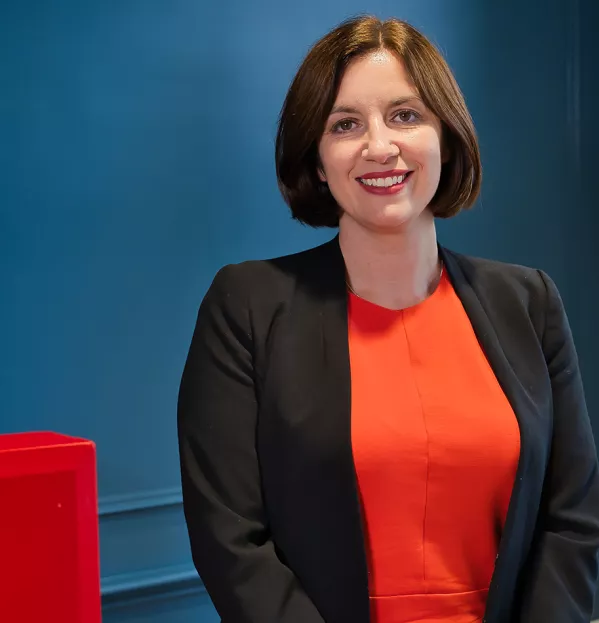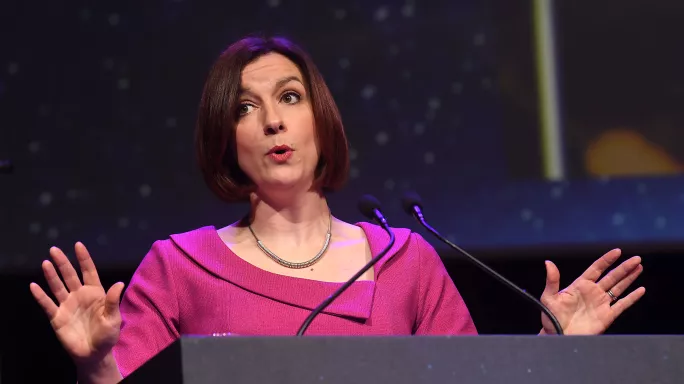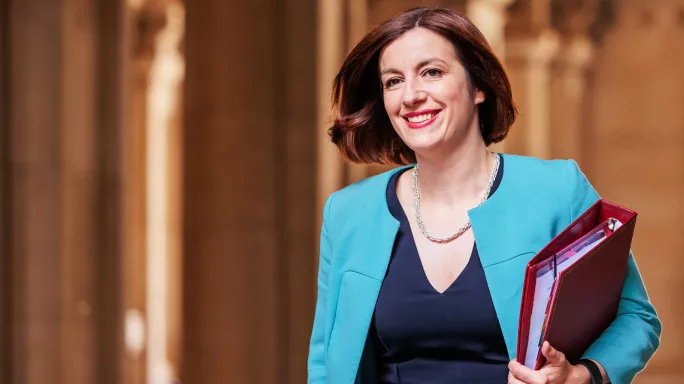Bridget Phillipson on her plan for the quiet revolution of education

The line inched forward slowly, but the mood remained excitable. Labour had won the general election a week earlier, and every teacher and school leader in that line had been handpicked (at least that’s how it felt to many of them) to be at an evening reception by the person awaiting them at the front: Bridget Phillipson, the new education secretary.
To be clear, this was a queue for selfies. The Department for Education did not instigate it - the line was to manage demand, not create it.
But those selfies would fill social media feeds for days to come and contribute to a sense that the self-confessed “shy kid” who grew up in Sunderland had, after 14 years as an MP and more than two years as shadow education secretary, not just finally made it into government, but had managed to win the hearts of the sector in just a few days.
While she would surely have been delighted with that perception and keen to assist it in hitting home, there is reason to think that Phillipson would have felt extremely uncomfortable standing at the head of that selfie queue.
Those who first meet her report her as being polite, clever and warm, but slightly distant. Those who have worked with her more closely in the first months of her tenure say she is happiest in the company of the small, close team that has followed her from opposition into government: her advisers Tim Waters, Vicky Salt, Owain Mumford, Rosy Roche and Ben Fazakerley.
The impression given is that the shy kid grew into a shy adult, one who wants to get things done as best she can while minimising the amount of focus she has to bring on herself personally.
If true, she must have found the selfie session incredibly unpleasant.
In her first sit-down interview with an education trade publication since becoming education secretary, she admits she is still “quite a reserved person”. However, she doesn’t believe she is guarded with people.
“I don’t think I behave differently being sat here to how I would behave if I was at a gig in Sunderland,” she says.
Meanwhile, if she seems to turn to her team a lot, she argues that’s a product of being in opposition for a long time and that this will begin to change now she is in government: “From opposition, you are by nature a small team of people. Then you arrive in a department as a small team of people among thousands of others. It is a big shift.”
Ultimately, though, all this personal talk seems an unwanted distraction to her - it’s not who she is that she thinks should be important, but what she does.
“I have a job to do, and that is what I will focus on,” she says. “I want to get through the work, make the decisions I need to make.”
Bridget Phillipson’s vision for education
So what about that work, then? What does an education system shaped by Bridget Phillipson look like?
We may need to be patient in seeing some of her vision come to fruition: Phillipson is honest about the budget constraints she is going to have to work within.
She says that education is a “really important area” for chancellor Rachel Reeves, but “the £22 billion black hole in public finances is a big and serious challenge we are going to have to grapple with”.
While she avoids going into specifics about the money she is asking for in the Spending Review, she does say that there are a number of longer-term challenges she needs to “make and win the argument for” that are “rooted in how we deliver better outcomes for children and young people”, but that “will involve some trade-offs and some difficult choices”.
The example she picks out is SEND - which is not just a financial challenge, but one on which she is keen not to jump to quick conclusions.
“In order to secure long-term reform, we need buy-in to that change and we need to work through what the options are,” she explains. “So I would urge for a bit of patience…because the last thing parents or teachers would want to see is for the system to become even more difficult than is the case right now. We are spending a lot of money as a country on what sometimes amounts to very poor outcomes for vulnerable children.”

A second area she focuses on is children’s social care. She says that a lot of the money being spent by the DfE is on “crisis intervention” and it needs to be refocused on early intervention.
She argues the previous government ignored the issue and shoved it in a “too-difficult box”, and that this has had a disastrous impact on schools that have been left “in a situation where they are having to deal with safeguarding concerns and worries that go beyond their level of expertise”.
If these seem quite obvious targets, it will be a comfort to those who work in schools that she appears extremely knowledgeable across other specific issues the sector is facing right now, too. Someone who has been working closely with her from day one says they are shocked at how across the detail of education she is.
“It’s not just the research she has done in opposition,” they say, “but she is like [former schools minister] Nick Gibb in that she can read and understand a huge amount of information in a very short time and form really smart judgements on that information.”
It’s well known that in opposition, both she and her minister for early education, Stephen Morgan, conducted hundreds of meetings with sector figures to find out the key challenges. What they learned has now been fed into the information that she has now been privy to at the department.
She is aware enough of the skills-versus-knowledge debate to sit on the fence (“I would reject that it is a binary choice”). She understands the sensitivities around pedagogy (“I am not a teacher…It is not for me to lecture teachers on how to best approach their teaching practice”). And she is across the issue of falling pupil rolls (“The last time this happened was with a very different schools landscape”).
More on Bridget Phillipson:
- DfE scraps Ofsted single-word school inspection grades
- Who is Bridget Phillipson?
- 12 questions for the Labour government on education
Importantly, behaviour came up a lot in those early meetings and she has since looked closely at the ongoing issues and debates in that area.
“I am concerned by the number of teachers who tell me that they have left or are considering leaving teaching because of problems around behaviour,” she says, although she adds that “the discussion on behaviour has become rather polarised”.
She says that parents have got a responsibility to ensure their children understand and follow what is expected at school, and teachers should be supported to maintain those standards.
She does add, though, that this should be done in a way that’s sensitive to mental health, to the fact children can experience challenges for reasons such as poverty, and with the understanding that some parents “don’t always know what is going on within school, so that is why it is right schools set expectations and have clear policies that everyone can understand and follow”.
What about exclusions, off-rolling and what many see as the existence of admissions policies geared to certain families (those where the child has SEND or behavioural challenges) being pushed elsewhere? It’s definitely on her radar.
“One area where I want to see greater focus when it comes to accountability is tackling precisely some of those challenges and those practices,” she states. “That is about what happens at an individual school level, but also about what happens at a trust level - that is why we need oversight when it comes to trusts.”
Labour’s approach to academy trusts
The mention of academy trusts in a negative context may accelerate the anxiety among the MAT sector that their status in the system is being diminished.
After being lauded as the solution to many education challenges under the Conservative government, many trust CEOs have felt a shift in tone under Labour that has been abrupt - MATs received no mention in the DfE release on how schools would be improved under the interim “no headline judgement” Ofsted system, and key decisions around conversions and transfers have been postponed.
Meanwhile, there are delays with the latest Trust Capacity Fund application process, and many feel that Phillipson has avoided talking about trusts where possible.
Asked if this is a deliberate tonal shift and about whether trusts are politically difficult for her to talk about with so much animosity towards them on the left of the party, Phillipson chooses her words carefully.
“Trusts have an important role to play in the system and I have had the opportunity to speak with many brilliant trust leaders who have done some pioneering innovative work,” she replies. “But what I am most interested in is a focus on the school itself regardless of the name above the door. And I think there has been insufficient focus on making sure that all schools are getting the support they need to improve, regardless of structure.”
Does she not think the current structure of the system is too chaotic, particularly the number of very small trusts where economies of scale are more difficult to realise and that collectively make DfE oversight more complex? Again, her reply is cautious.
“Overall, we need to move to a system that is more rooted in partnership and collaboration…[The system] has become fragmented, and we need to find ways of working together to deliver better life chances for our children,” she says.

On CEO pay - something that many detractors of the trust system frequently cite as a key problem - she is a little clearer: “I think, given the fiscal environment overall, it is incumbent on everyone in leadership positions to be thinking about how they are spending public money.”
If some of this sounds a little vague, that is likely because Phillipson has yet to make her mind up fully on the direction of travel, according to sources close to the DfE.
Similar vagueness applies to other policies, primarily how Labour will recruit 6,500 new teachers and retain more of the profession. Phillipson says she wants to reduce the unfair burdens on the sector and let teachers focus on teaching - and the government has expanded the Every Lesson Shapes a Life campaign - but there is little in the way of a fully fleshed-out plan.
Sources say this is unlikely to be down to an inability to make a call; more that she has yet to find an argument convincing enough to sway her one way or another. When talking about her decision-making process in the interview, she seems to provide some evidence for that view of her.
“When I make decisions, I want to make sure I am absolutely doing the right thing,” she says. “That it is not just what is rooted in the evidence, but what will work.”
That stance is commendable but it will slow the change process down - and that is difficult in a political context that demands momentum and in a sector that requires urgent fixes. With the financial constraints slowing things further - as well as a department many say needs radical overhaul to be fit for purpose on implementation - it is clear that compromises will have to be made.
New policies and the measure of success
How her political peers and the profession assess those compromises may be a key determiner of how her time at the DfE is ultimately judged.
A good indicator of which way they may sway will be the reaction at the end of next year to the compromise she seems to have made with accountability, in the form of the rushed timetable for Ofsted reform: she has set out a very ambitious plan on a very uncharacteristic short timeline.
As she seems to acknowledge, what is coming to schools in September 2025 is not going to be palatable to some.
“School leaders need to be aware that this is not going to be an easier system; it is going to be a different system and in many ways a more robust system that will shine a light on areas where there is poor performance [and] where we need to make more progress, especially when it comes to support for children experiencing the greatest levels of disadvantage,” she states.
So will there still be a queue of teachers and school leaders wanting selfies with her at the end of the 2025-26 school year? Will she have done enough on her other “missions” to satisfy her political masters?
You get the sense her concern lies more with whether, at the end of that year, disadvantaged children are getting a better deal as a result of what she has done by that point. Though she is of course ambitious, young people’s outcomes are what seem to matter to her most.
And as that aim chimes with the aim of almost all in the sector - and her party leaders - she’ll be hopeful that the support the sector and Sir Keir Starmer have offered her thus far endures.

Register with Tes and you can read two free articles every month plus you'll have access to our range of award-winning newsletters.
topics in this article



